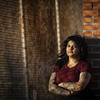Barrier Buster
Some lawyers might hesitate to admit that power is what drives them. But for Noelia Rivera-Calderón, LAW ’19, power is the point.
Some lawyers might hesitate to admit that power is what drives them. But for Noelia Rivera-Calderón, LAW ’19, power is the point.

Photo by Photo credit: Ryan S. Brandenberg, CLA ’14
It’s kind of taboo to talk about power. But law and policy is in a lot of ways about how power is distributed and who has access to decision-making and who doesn’t.”

Growing up as a student in the Philadelphia School District, Rivera-Calderón felt out of place as Latinx and a member of the LGBTQIA+ community and struggled with her mental health.
After earning a bachelor’s degree in education in Boston, Rivera-Calderón returned to Philadelphia and became a teacher in her former district. But she saw the same issues she had faced being perpetuated.
“I felt like I only had so much power within my classroom,” Rivera-Calderón said.
Then she decided to do something about it.
In 2016, Rivera-Calderón enrolled at Temple’s Beasley School of Law. She held internships at various nonprofits and Philadelphia City Hall, getting a firsthand look at policy from multiple angles.
But it was an internship at the National Women’s Law Center (NWLC) in Washington, D.C., where Rivera-Calderón made her mark. The center employs an education team that focuses on inequities for girls, and Rivera-Calderón noticed a “gap” relating to her own life experiences.
Rivera-Calderón began interviewing students at various schools in Philadelphia to help craft policy proposals for the NWLC.
Often, students said they would interact with school counselors who were not equipped to support mental health needs or were unfamiliar with Latinx culture, sometimes even overlooking legitimate cries for help.
She encapsulated her findings in a report, We are Not Invisible (No Somos Invisibles), which proposed policy solutions. The report was picked up by national media and lawmakers at all levels. It also sparked a letter from members of Congress to the Departments of Education and Health.
The successful project helped Rivera-Calderón return to the NWLC full time under a fellowship, which supported her development of a curriculum to help teachers better support LGBTQIA+ students.
School: Beasley School of Law
Degree: JD, 2019
Industry: Law and public policy
Hometown: Philadelphia, Pennsylvania
In 2020, Rivera-Calderón returned to Philadelphia for a clerkship with federal judge Nitza I. Quiñones Alejandro. But she envisions getting back into policymaking and fighting for students’ rights.
Looking back, she shared, “On a much larger scale, I wanted to get rid of whatever obstacles I could, or at least make things better for students and schools.”
—By Kyle Bagenstose, KLN ’11, and Samara Grossel, KLN ’17